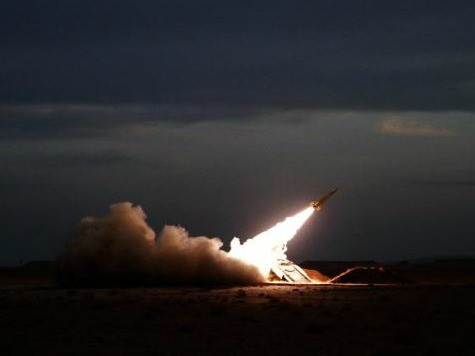Though he ran as the anti-war candidate, and took office with an outstretched hand to America’s rivals, the course President Barack Obama has set may lead to a direct war with Iran, whether he likes it or not.
That is because the ambitions of the Iranian regime–geopolitical hegemony over the Middle East, and the millenarian fantasies of militant Shia Islam–are fundamentally at odds with core American interests.
The election of moderate cleric Hassan Rouhani last week is perhaps a sign of hope. Yet the regime screens out any candidates that might interfere with its policies, and quickly sidelines reformists that overstep their bounds.
It is troubling that even Hezbollah–currently leading the Syrian army to battle–joined the West in welcoming Rouhani’s election, calling him a “sign of hope,” presumably not for a peaceful end to the conflict.
By arming the Syrian rebels, Obama has entered a proxy war with the Iranian regime, which is backing Syrian dictator Bashar al-Assad with weapons, soldiers, advisors and money. Because it is transparently obvious that U.S. assistance is are too little, too late and will pose no real deterrent, it seems that the main purpose of the aid is not to help the rebels win but to increase pressure on rebel groups to join multilateral peace talks.
Yet Iran is playing for keeps. It has three basic interests at stake in Syria. One: it wants to prevent the rise of a new Sunni-dominated Islamist state in the region. Two: Syria is a key corridor for transferring weapons and soldiers to (and from) Iranian-backed Hezbollah in Lebanon. Three: by controlling Syria, Iran will have secured an arc of influence stretching directly from Afghanistan to the Mediterranean, with no interruptions.
Russia is betting on Iran. It wants to keep the Iranian regime in check, but it is happy to see U.S. power wane in the Middle East–and is hoping that its support for Iran’s nuclear technology and its efforts in Syria will pay diplomatic dividends. The supply of Russian S-300 air-defense missiles to Syria is a game-changer, and could, once redeployed, block Israel’s ability to destroy Iranian nuclear facilities as it did Syria’s in 2007.
Humanitarian interventions aside, overall U.S. policy under Obama remains withdrawal. Obama declined the opportunity to take advantage of Iran’s weakness in 2009, failing to support pro-democracy protests diplomatically, much less militarily. He then withdrew U.S. troops from neighboring Iraq to the west, and is withdrawing from neighboring Afghanistan to the east. (Iran backed anti-U.S. insurgents in both cases.)
Obama–and many Republicans–are also embracing a different kind of withdrawal, well-intentioned but illusory: namely, the withdrawal from fossil fuels in the Middle East. Though alternative fuels have been a bust so far, the U.S. shale boom–despite Obama’s best efforts–has boosted U.S. energy independence. Yet the fact that the U.S. buys less Middle East oil does not mean it will lose its strategic importance.
New demand from fuel-hungry China, among other nations, is helping to keep the Middle East and its oil strategically crucial. If Iran establishes itself as the dominant power in the region–which it probably will if it becomes a nuclear-armed state–then it can exert significant influence on oil, as well as shipping and trade. And it will do so to the benefit of Russia and China, the latter a growing threat in the Western Pacific.
Therefore accepting Iranian dominance in the Middle East could mean accepting diminished American power everywhere, along with less of everything America has defended–albeit imperfectly–including free trade and freedom generally. And, of course, allowing Iran to become dominant means that Israel, America’s best ally in the Middle East and the only open society in the region, will be at serious risk of annihilation.
A war between Israel and Iran might not draw in the United States–and despite the protestations of his supporters it is difficult to imagine President Obama backing an Israeli pre-emptive strike, or defending Israel from an Iranian attack in time to prevent significant damage. Yet one thing is clear: sacrificing Israel will not save the U.S. from the challenge that Iran poses, and with which the administration fails to reckon.
That is a strategic failure that began under Obama’s predecessor, George W. Bush, who did not anticipate the degree to which Iran would influence a post-Saddam Iraq. But Obama has exacerbated that strategic failure by allowing Iran to drag out nuclear talks beyond the point of absurdity, as well as by backing the Muslim Brotherhood’s political ambitions, letting U.S. strategy be dictated by news cycles and election calendars.
In the abstract, it has long been in America’s interest to weaken the Syrian regime–which is why Democrats’ attempts to rehabilitate Assad after 2007, and Obama’s effort to restore diplomatic relations after 2009, were so counter-productive. That became even more the case once Assad became Iran’s key Arab ally. The prospect of Syria being ruled by Al Qaeda-linked Islamists, however, complicates U.S. strategy somewhat.
Neither side’s outright victory would benefit the U.S. It might, strategically, be best to see the conflict continue to drain Iranian resources, but that would come at a humanitarian cost the U.S. is unwilling to pay. A “peace process” would be best, but is unlikely. Ultimately, the only way to solve Syria is to solve Iran. Without Iran, Assad will disappear–and what replaces him, while bad, would likely be less dangerous in that circumstance.
It is well past time for regime change in Iran to become the strategic goal–diplomatically and, if necessarily, militarily. It is because we have been unwilling to consider that possibility that the Iranian dictatorship–sham elections notwithstanding–has persisted, more through our weakness than its strength.
War with Iran may be now inevitable: the question is whether we will choose to be taken by surprise, and at what cost.

COMMENTS
Please let us know if you're having issues with commenting.